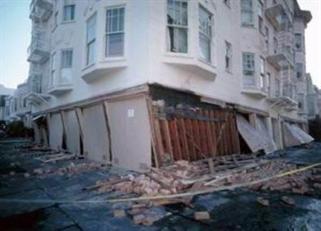| | | Earthquake PreparednessIf your odds of winning the lottery were 62%, would you buy a ticket? If your odds of experiencing a devastating earthquake were 62%, would you take steps to prepare yourself? According to a U.S. Geological Survey study in September 2005, there is a 62% chance that an earthquake of magnitude 6.7 or greater will occur in the Bay Area within 26 years; it could happen today. Since the quake is most likely to occur on the Northern Hayward or the Rodgers Creek faults, both of which are close to Solano County, there is a real potential for widespread devastation anywhere in the county.
With some basic planning and thinking ahead, preparing your home or workplace for an earthquake is easy. These tips on what to do before, during and after an earthquake may help save you or your loved ones the next time around.

Before An Earthquake How well you, your family and your home survive an earthquake often depends upon how well you prepare beforehand. Develop a family and neighborhood earthquake plan. The following checklist will help you get started: -
Prepare an emergency kit of food, water, and supplies including a flashlight, portable battery-operated radio, batteries, medicines, first aid kit, money and clothing. -
Know the safe spots in each room -- under sturdy tables, desks, or against interior walls. -
Know the danger spots -- near windows, mirrors, hanging objects, fireplaces and tall, unsecured furniture. -
Conduct practice drills so you and your family know the safe locations in your home. -
Decide how and where your family will reunite if separated during a quake. -
Choose an out-of-state friend or relative who family members can call after the quake to report their whereabouts and conditions. -
Learn first aid and CPR (cardiopulmonary resuscitation.) -
Learn how to shut off gas, water, and electricity in case the lines are damaged. SAFETY NOTE: Do not attempt to relight the gas pilot. Call the utility company. -
Check chimneys, roofs, walls and foundations for stability. Make sure your house is bolted to its foundation. -
Secure your water heater and major appliances as well as tall, heavy furniture, hanging plants, mirrors and picture frames -- especially those over beds. -
Keep breakables, heavy objects, flammable or hazardous liquids such as paints, pest sprays and cleaning products, in secured cabinets or on lower shelves. -
Organize your neighborhood to be self-sufficient after a quake. During An Earthquake -
If indoors, stay there. Get under a desk or table or stand in a corner. -
If outdoors, get into an open area away from trees, buildings, walls and power lines. -
If in a high-rise building, stay away from windows and outside walls. Get under a table. Do not use elevators. -
If driving, pull over to the side of the road and stop. Avoid overpasses and power lines. Stay inside your car until the shaking is over. -
If in a crowded public place, do not rush for the doors. Crouch and cover your head and neck with your hands and arms. After An Earthquake Unless there is an immediate, life-threatening emergency, do not attempt to use the telephone. After a quake, be sure to: -
Check for gas and water leaks, broken electrical wiring or sewage lines. If there is damage, turn the utility off at the source and immediately report gas leaks to your utility company. Check for downed power lines; warn others to stay away. -
Check your building for cracks and damage, including the roof, chimneys and foundation. -
Turn on your portable radio for instructions and news reports. For your own safety, cooperate fully with public safety officials and follow instructions. -
Do not use your vehicle unless there is an emergency. Keep the streets clear for emergency vehicles. -
Be prepared for aftershocks. -
Stay calm and lend a hand to others. -
If you evacuate, leave a message at your home telling family members and others where you can be found. |
| | | |